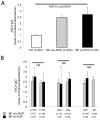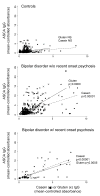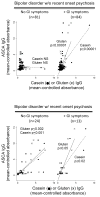Seroreactive marker for inflammatory bowel disease and associations with antibodies to dietary proteins in bipolar disorder
- PMID: 24313887
- PMCID: PMC4075657
- DOI: 10.1111/bdi.12159
Seroreactive marker for inflammatory bowel disease and associations with antibodies to dietary proteins in bipolar disorder
Abstract
Objectives: Immune sensitivity to wheat glutens and bovine milk caseins may affect a subset of individuals with bipolar disorder. Digested byproducts of these foods are exorphins that have the potential to impact brain physiology through action at opioid receptors. Inflammation in the gastrointestinal (GI) tract might accelerate exposure of food antigens to systemic circulation and help explain elevated gluten and casein antibody levels in individuals with bipolar disorder.
Methods: We measured a marker of GI inflammation, anti-Saccharomyces cerevisiae antibodies (ASCA), in non-psychiatric controls (n = 207), in patients with bipolar disorder without a recent onset of psychosis (n = 226), and in patients with bipolar disorder with a recent onset of psychosis (n = 38). We compared ASCA levels to antibodies against gluten, casein, Epstein-Barr virus (EBV), herpes simplex virus 1 (HSV-1), influenza A, influenza B, measles, and Toxoplasma gondii.
Results: Elevated ASCA conferred a 3.5-4.4-fold increased odds ratio of disease association (age-, race-, and gender-corrected multinomial logistic regressions, p ≤ 0.00001) that was independent of type of medication received. ASCA correlated with food antibodies in both bipolar disorder groups (R(2) = 0.29-0.59, p ≤ 0.0005), and with measles and T. gondii immunoglobulin G (IgG) in the recent onset psychosis bipolar disorder group (R(2) = 0.31-0.36, p ≤ 0.004-0.01).
Conclusions: Elevated seropositivity of a GI-related marker and its association with antibodies to food-derived proteins and self-reported GI symptoms suggest a GI comorbidity in at least a subgroup of individuals with bipolar disorder. Marker seroreactivity may also represent part of an overall heightened activated immune state inherent to this mood disorder.
Keywords: autoimmunity; environment; gastrointestinal; immunology; infection; mood disorder.
© 2013 John Wiley & Sons A/S. Published by John Wiley & Sons Ltd.
Conflict of interest statement
None of the other authors report any potential conflicts of interest.
Figures



References
-
- Dickerson F, Stallings C, Origoni A, Vaughan C, Khushalani S, Alaedini A, et al. Markers of gluten sensitivity and celiac disease in bipolar disorder. Bipolar Disord. 2011;13:52–8. - PubMed
-
- Dickerson F, Stallings C, Origoni A, Vaughan C, Khushalani S, Leister F, et al. Markers of gluten sensitivity and celiac disease in recent-onset psychosis and multi-episode schizophrenia. Biol Psychiatry. 2010;68:100–4. - PubMed
-
- Dickerson F, Stallings C, Origoni A, Vaughan C, Khushalani S, Yolken R. Markers of gluten sensitivity in acute mania: A longitudinal study. Psychiatry Res. 2012;196:68–71. - PubMed
Publication types
MeSH terms
Substances
Grants and funding
LinkOut - more resources
Full Text Sources
Other Literature Sources
Medical

